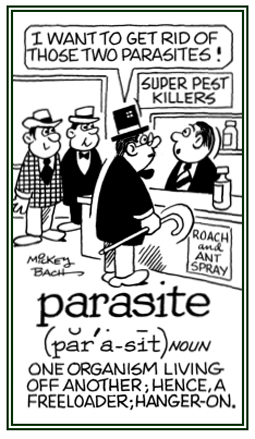sitio-, siti-, sito-, sit-, -sitia +
(Greek: food; eating; appetite)
hemiparisite
1. A plant, such as mistletoe, that obtains some nourishment from its host but also photosynthesizes; also, semiparasite.
2. An organism that can live either independently or as a parasite.
2. An organism that can live either independently or as a parasite.
holoparasite
A nonphotosynthetic parasite that must obtain carbohydrates found in the host plant phloem (food-conducting tissue of a plant).
A parasitic flowering plant that lacks chlorophyll (nonphotosynthetic) and must rely totally on the contents of the xylem (woody part of plants; supporting and water-conducting tissue) and the phloem of the host plant.
hyperparasite
1. A secondary parasite capable of development within a previously existing parasite.
2. An organism that is parasitic on or in another parasite.
3. A parasite that preys on another parasite.
2. An organism that is parasitic on or in another parasite.
3. A parasite that preys on another parasite.
macroparasite
A parasite, such as a louse or an intestinal worm, that is big enough to be visible to the "naked" eye.
microparasite
A microorganism that lives as a parasite on other organisms and which is too small to be seen with the "naked" eye.
necroparasite
A parasite that decomposes nonliving organic matter to obtain nutrients that are then absorbed through cell membranes.
nosoparasite
1. An organism associated with a particular disease and able to modify its coarse, but not serving as the actual causal agent; or to put it another way: a microorganism found in conjunction with a disease process that, while capable of modifying the course of the disease, is not its cause.
2. A pathogenic parasite that attacks only already diseased tissues.
2. A pathogenic parasite that attacks only already diseased tissues.
omphalosito
The member of a pair of conjoined twins of unequal size that is smaller and parasitic and that receives its blood supply by way of the larger twin.
1. An organism that lives on another body or in another species, known as the host, of which it obtains nutriments: Mistletoe is a parasite that lives on trees and is used in some cultures as a holiday decoration in homes.
2. A person who receives support, advantage, or the like, from another or others without returning anything useful; such as, anyone who lives on the hospitality of others: Some citizens are of the opinion that people who are receiving financial support from the government for doing nothing in return are really useless parasites and should be forced to work.
3. In ancient Greece, a person who received free meals in return for amusing or making flattering remarks, etc.: Some royal courts in ancient Greece employed parasites to entertain them with music or to provide humorous conversations.
4. From Latin parasitus, from Greek parasitos "someone who eats at the table of another"; "feeding beside" from para- "beside" + sitos "food".

© ALL rights are reserved.

© ALL rights are reserved.
Go to this Word A Day Revisited Index
2. A person who receives support, advantage, or the like, from another or others without returning anything useful; such as, anyone who lives on the hospitality of others: Some citizens are of the opinion that people who are receiving financial support from the government for doing nothing in return are really useless parasites and should be forced to work.
3. In ancient Greece, a person who received free meals in return for amusing or making flattering remarks, etc.: Some royal courts in ancient Greece employed parasites to entertain them with music or to provide humorous conversations.
4. From Latin parasitus, from Greek parasitos "someone who eats at the table of another"; "feeding beside" from para- "beside" + sitos "food".


Go to this Word A Day Revisited Index
so you can see more of Mickey Bach's cartoons.
parasitemia, parasitaemia
The presence of parasites (especially malarial parasites) in the blood.
parasitic
1. Of, relating to, or characteristic of a parasite.
2. Caused by or resulting from the effects of parasites.
3. Relating to or having the habit of a parasite; such as, living on another organism.
2. Caused by or resulting from the effects of parasites.
3. Relating to or having the habit of a parasite; such as, living on another organism.
parasitical
1. Of the nature of a parasite; fawning for food or favors; sycophantic.
2. Of or pertaining to parasites; living on, or deriving nourishment from, some other living animal or plant.
2. Of or pertaining to parasites; living on, or deriving nourishment from, some other living animal or plant.
parasiticidal
An agent that is capable of expelling or destroying parasites; such as, parasitic worms.
parasiticide
1. An agent or preparation that destroys (kills) parasites.
2. Destructive to parasites.
3. An agent that destroys parasites, e.g. such as those that infest the skin.
2. Destructive to parasites.
3. An agent that destroys parasites, e.g. such as those that infest the skin.
parasitifer
An organism that serves as the host of a parasite.
Cross references of word families that are related directly, or indirectly, to: "food, nutrition, nourishment": alimento-; broma-; carno-; cibo-; esculent-; tropho-; Eating Crawling Snacks; Eating: Carnivorous-Plant "Pets"; Eating: Folivory or Leaf Eaters; Eating: Omnivorous.


